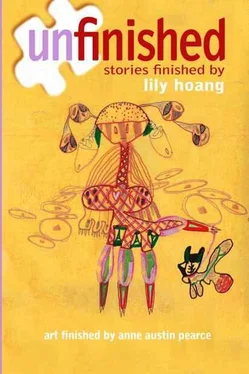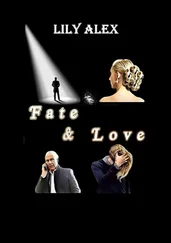Lily Hoang - Unfinished - stories finished by Lily Hoang
Здесь есть возможность читать онлайн «Lily Hoang - Unfinished - stories finished by Lily Hoang» весь текст электронной книги совершенно бесплатно (целиком полную версию без сокращений). В некоторых случаях можно слушать аудио, скачать через торрент в формате fb2 и присутствует краткое содержание. Издательство: Jaded Ibis Press, Жанр: Современная проза, на английском языке. Описание произведения, (предисловие) а так же отзывы посетителей доступны на портале библиотеки ЛибКат.
- Название:Unfinished: stories finished by Lily Hoang
- Автор:
- Издательство:Jaded Ibis Press
- Жанр:
- Год:неизвестен
- ISBN:нет данных
- Рейтинг книги:5 / 5. Голосов: 1
-
Избранное:Добавить в избранное
- Отзывы:
-
Ваша оценка:
- 100
- 1
- 2
- 3
- 4
- 5
Unfinished: stories finished by Lily Hoang: краткое содержание, описание и аннотация
Предлагаем к чтению аннотацию, описание, краткое содержание или предисловие (зависит от того, что написал сам автор книги «Unfinished: stories finished by Lily Hoang»). Если вы не нашли необходимую информацию о книге — напишите в комментариях, мы постараемся отыскать её.
Unfinished: stories finished by Lily Hoang — читать онлайн бесплатно полную книгу (весь текст) целиком
Ниже представлен текст книги, разбитый по страницам. Система сохранения места последней прочитанной страницы, позволяет с удобством читать онлайн бесплатно книгу «Unfinished: stories finished by Lily Hoang», без необходимости каждый раз заново искать на чём Вы остановились. Поставьте закладку, и сможете в любой момент перейти на страницу, на которой закончили чтение.
Интервал:
Закладка:
We have heard that the whore was also this beautiful.
Not that we are saying that she who does not belong is the whore.
Although she can see the line that none of us can see.
Our people are kind in nature. We do not go picking fights with our own kind, or any other kind for that matter. We are peaceful. We have never warred.
The only time of conflict in both our recorded and oral histories dates back to the years directly before the whore appeared. This was a time of great turmoil for us. It was unhappy with us, although we did not know why. It is said that the elders of our great land said that it was because we were not working hard enough, because we were not expelling enough of it . Our bodies became tainted with it, and we could not function.
When our bodies attain too much it, we cannot swallow. Although we have never seen it, there are photographs and diagrams attesting to this truth. When our bodies build up too much it, we die of starvation, unless we can muster the strength to work until exhaustion. Then, some of it may be released, allowing us to swallow bits of broth or applesauce.
During the time of great turmoil, many of us stored an excess of it in our bodies. We were weakened. Then, according to our recorded and oral histories, it brought forth storms of enormous proportions. All our housing was destroyed. Rods of thunder and tips of tornadoes ripped apart our machines.
Then, a piece of hail that would not melt dove into one of our homes. It held the scent of cardamom and some herb long extinct. How do we know the scent of death?
The home held a family. We allowed the family to determine our future: the scent of death wandered through our land.
We knew we had to kill the family.
But not everyone wanted to. Many of our people argued that smell alone cannot determine death.
We argued that it was not the smell so much as the hail that would not melt.
They argued coincidence.
We argued that there had been many deaths. Something must be done.
They argued that killing was not an answer.
We killed them anyway.
We learned the scent of death. We learned the lesson it wanted us to learn.
Days later, the whore arrived.
Chronology is irrelevant. What is certain, however, is that the day the whore arrived, she offered us a machine — in a time when all our machines were broken — and a solution.
Since the time of the whore, there have been no fights or misunderstandings. We maintain words such as “fight” or “misunderstanding” as marks of our evolution, our development. Conceptually, we can comprehend the definitions of these words, but we have not experienced them personally.
This does not mean we are any more lenient on she who does not belong. Although we have developed great capacity for both empathy and sympathy, she who does not belong challenges our very existence. She makes us angry.
But: We have never felt anger. How do we know it is anger we feel?
Or else: We call it anger, but could it not be love, sacrifice, or despair?
Assuming: Our language accounts accurate portrayals of emotions we have never felt.
The thing about she who does not belong is that for so long, we have accepted her. We have made her part of our families. We have invited her to dine with us, to sleep in our homes, to share.
Also: Our lives leave us no room for complaint, and yet here she is, complaining.
She says, “We shouldn’t have to work like this.”
We don’t understand what she means. There is no other way.
She says, “Why do we work like this?”
We work this way because it is the way we work.
She says, “Why do we not rest? Why do we not take breaks? Why do we not vacation?”
We have never heard of this word “vacation.” It sounds fatal. It sounds like “plague,” which we have also never experienced but there is rumor that other countries far away have plagued.
She says, “This life takes it out of you.”
We say, “Then leave.”
She says, “And where will I go? What will I do? This is my home.”
We don’t want her here.
She says, “If I go, who will operate the whore’s machine?”
She practices a certain logic. That much can never be questioned. She is the only one who can work the whore’s machine. Because of she who does not belong, we trade and barter. She who does not belong is valuable.
See: In our land, each person has a particular position. Each person serves a purpose. It is because each person fulfils her role that we can think and speak in unison. It is because each person works to make a whole that we do not have conflict.
See: This is why she who does not belong has become a problem.
She says, “Who will work the whore’s machine?”
We do not know why we entrusted such a valuable operation to she who does not belong, she who does not have proof of lineage. We are too trusting.
We call her, “Fraud!”
She says, “If I run, you will chase me.”
We reckon this is true.
Or: We will simply let her run. We will let her leave.
She says, “If you chase me, I will make you cross the whore’s line, which you cannot see but I can.”
We think if she ran, we would not chase her.
Assuming: There was someone else here who could work the whore’s machine.
There is no one else.
We say, “Let us negotiate.”
She says, “You will believe that I belong.”
This is not a possibility, but we do not know to obscure truth.
We say, “This is not a possibility, although we will try.”
She says, “You will accept me. If you do not, I will run. Then, you will need to chase me. If you chase me, I will take you into the whore’s land. Then, she will punish you.”
We say, “We can only try.”
She says, “This is not a negotiation.”
We do not know exactly what “negotiation” is.
We say, “What else?”
She says, “From here on, I will continue to work the whore’s machine but only if we work only three hours a day.”
This is not possible. If we work three hours a day, our days must necessarily shrink as well.
Or: Perhaps we can trick her.
We can elongate one hour to equal five. Then, surely, we can work only three hours a day.
But we have never used trickery before. Not even once. We are not sure it works.
She says, “We will work only three hours a day, but those three hours will be not be wasted doing menial things such as talking or reading unrelated materials. We will work three hours a day, but they will be three full hours, without distraction and irrelevance.”
This is not possible.
She says, “Three hours of focused work will be the equivalent of our current fifteen hours of tired, exhausted work.”
But: What will we do with all this additional time?
She says, “Those are my terms.”
We say, “It will not be happy with this. We cannot do what it deems improper.”
We possess a certain logic as well.
She who does not belong stands facing the water. There is a small strip of land separating her from the ocean. One hand sits atop the whore’s machine. It is old and very simple: a rusty handcrank, some engravings on the box, a slot for the output. We have never seen inside the whore’s machine. It is magic. The whore is a cunning witch magician.
Water licks the edges of land that is not ours.
the man & his treasure (from Justin Dobbs)
The man is never going to let loose of the treasure he possesses. It is a treasure unlike any treasure he has ever known. It is unlike any treasure anyone he’s ever known has ever known. It’s a special treasure, which the man knows, and knowing, he can let no one else know, or they will come and connive their way into this treasure that is rightfully his.
Читать дальшеИнтервал:
Закладка:
Похожие книги на «Unfinished: stories finished by Lily Hoang»
Представляем Вашему вниманию похожие книги на «Unfinished: stories finished by Lily Hoang» списком для выбора. Мы отобрали схожую по названию и смыслу литературу в надежде предоставить читателям больше вариантов отыскать новые, интересные, ещё непрочитанные произведения.
Обсуждение, отзывы о книге «Unfinished: stories finished by Lily Hoang» и просто собственные мнения читателей. Оставьте ваши комментарии, напишите, что Вы думаете о произведении, его смысле или главных героях. Укажите что конкретно понравилось, а что нет, и почему Вы так считаете.






![О Генри - Неоконченный рассказ [An Unfinished Story]](/books/415443/o-genri-neokonchennyj-rasskaz-an-unfinished-story-thumb.webp)





